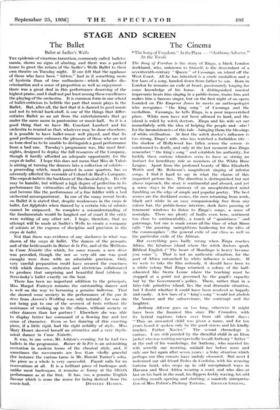The - Cinema
The Song of Freedom is the story of Zinga, a black London dockhand, who, unknown to himself, is the descendant of a seventeenth-century " Queen " of Cassanga, an island off the West Coast. All he has inherited is a crude medallion 'and a few bars of a song, handed down from father to son. Born in London he remains an exile at heart, passionately longing for Some knowledge of his home. A distinguished musical impresario hears him singing in a public-house, trains him and makes him a famous singer, but on- the first night of an opera founded on The Emperor Jones he meets an anthropologist who recognises " the king song " of Cassanga and the medallion. Cassanga, he tells Zinga, is a poor impoverished place. White men have not been allowed to land, and the island is ruled by witch doctors. Zinga and his wife set out immediately with the idea of helping the people and—alas ! for the- inconsistencies of this tale—bringing them the blessings of white- civilisation. At first the witch doctor's influence is too strong, Zinga's wife, who has watched a forbidden rite— the shadow of Hollywood has fallen across the screen—is condemned to death, and only at the last moment does Zinga remember " the king's song " and establish his authority, for luckily these curious islanders seem to have as strong an instinct for hereditary rule as members of the White Rose League. Apart from the profound beauty of Miss Elisabeth Welch and Mr. Robeson's magnificent singing of inferior songs, I find it hard to say in what the charm of this imperfect picture lies. The direct-ion is distinguished but not above reproach, the story is sentimental and absurd, and yet * sense stays in the memory of an unsophisticated mind fumbling on the edge of simple and popular poetry. The best scenes are the dockland scenes, the men returning from work, black and white in an easy companionship free from any colour bar, the public-house interiors, dark faces pausing at tenement windows to listen to Zinga's songs, a sense of nostalgia. There are plenty• of faults even here, sentiment too close to sentimentality, a touch of " quaintness " and patronage, but one is made aware all the time of what:Maim calls " the gnawing surreptitious hankering for the bliss of the commonplace ", the general exile of our class as well as the particular exile of the African.
But everything goes badly wrong when Zinga reaches Africa, the fabulous island where the witch doctors speak Biblical English (" The heart of Mandingo is heavy because you come "). That is not an authentic situation, for the part of Africa untouched by white influence is minute. If we were to take the film seriously, it should have been to a white colony that Zinga returned, a colony of the half- educated like Sierra Leone where the teaching must be stopped at a point not governed by the pupil's capacity but by the Government's policy. There, rather than in a fairy-tale primitive island, lies the real dramatic situation, but I doubt whether it could have been resolved as happily and easily. A few bars of a "- king's song" would not abolish the bounce and the subservience, the contempt and the laughter.
Anthony Adverse goes on too long. otherwise it might have been the funniest film since The Crusaders, with its lyrical captions taken over from old silent days : "Thus an unwanted child was given a name, and for ten years heard it spoken only by the good sisters and his kindly teacher, Father Xavier." The sexual chronology is curious. I am still puzzled by -the dreadful child in an Eton jacket who was waiting unexpectedly to call Anthony " father " at- the end of his wanderings, for Anthony, who married his wife secretly one morning. mislaid .her before noon and only saw her again after seven years : a fishy situation which perhaps our film censors have unduly obscured. But most I welcomed our old friend Pedro -de Cordoba, with-his weaving -tortoise head, who crops up in odd unexplained. ways in Havana and West Africa wearing a cowl, and who dies at last on his back in the mud, his flippers feebly waving, his odd 'receding mouth opening and shutting,- a masterly interpreta- tion of Miss Potter's Ptolemy Tortoise: GRAHAM GREENE6


















































 Previous page
Previous page